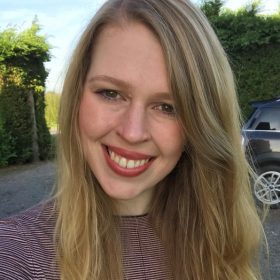PhD students, Kate Allen and Mary Fredlund, scored a double triumph when they were awarded first and second places for their presentations at the College of Medicine and Health’s recent Annual Research Event (ARE). Held over three days, the event is an opportunity for postgraduate researchers from The Institute of Health Research (IHR) and the Institute of Biomedical and Clinical Science (IBCS) to showcase their work and to learn about the work of their peers. The awards are an important time of year when students from both institutes have the opportunity to come together.
Kate and Mary came first and second respectively in the IHR category for their presentations, Family focused interventions that have combined impacts across parental domestic violence, mental ill-health, and substance misuse: a systematic review and Why map dementia interventions?
Kate Allen said: ““The ARE is an excellent opportunity to hear about our peers’ work, celebrate our achievements, and practice our ever-important presentation skills in a friendly and supportive environment. This year, I decided to present the findings from the first study of my PhD and I was delighted to win first prize within the IHR. It’s great to finally share some of the results and winning has given me the extra confidence to present the findings at my first European conference in September. Fingers crossed it will go just as well!
Mary Fredlund said: “A key part of any PhD project is attending and presenting at conferences, but at the start of my PhD this was bottom of my want to do list. However, the ARE felt like a vibrant and friendly place to present my work, hear about the range of research being undertaken in the college and to have focused and thought provoking discussions about the direction and practices of high quality ethical health research. I wasn’t expecting to get a prize for my presentation and my surprised reaction was a bit embarrassing – I’m glad I didn’t have the same squeaky voice during my presentation! It was a real honour to be acknowledged and I’m proud to come second to Kate, who as a researcher and colleague is a real inspiration to me.”
Kate on her research:
“Domestic violence, mental ill-health, and substance misuse are three public health issues that tend to cluster. They can have a negative impact on parenting capacity, are likely to be intergenerational, and are increasing in prevalence due to COVID-19 related restrictions. Despite this, service provision and commissioning for these three issues has historically been siloed, meaning families are presented with numerous barriers to accessing the support they need. My PhD is exploring how we might better support families at risk of, or experiencing, these three clustering public health issues by examining what interventions might have combined impacts on parental domestic violence, mental ill-health, and substance misuse.
This is the first time I’ve conducted a systematic review and it’s given me an opportunity to learn about, and implement, meaningful patient and public involvement and engagement (PPIE), develop and conduct thorough search strategies, manage a team of dedicated second reviewers, conduct data extraction and quality appraisal, and find creative ways to visualise and communicate my results with a range of service providers and commissioners. I used the presentation to try and capture this; not only giving an overview of some of the background, methods, and initial results (which I hope to share more widely soon!), but also some of the key things that I’ve learnt so far. For example, I’ve learnt systematic reviews (and particularly large ones like my own) are harder than people might think. I’ve also learnt that PPIE is essential for making your review relevant and useful (you can find support with this here), and that information specialists are key to supporting you with the development and conduct of your searches (please do check out the search and review clinics for help with this).”
Mary on her research:
“In terms of dementia, my project aims to make an evidence map (or maps) of the research about Non-pharmacological interventions for dementia behaviours. This focus is important as about 90% of people with dementia are affected by one or more behavioural and psychological symptoms. These can interfere with carrying out everyday tasks and interacting socially, negatively impacting on the quality of life for people living with dementia and their families. Yet these interventions are under-used. My work is about increasing the accessibility to the wealth of evidence that already exists by mapping the research together in one place.
My project explores and develops the methods used for producing an interactive and visual evidence and gap map (an EGM). Since this is an emerging area of evidence synthesis, many elements of EGM production need clarity. The aim of an EGM is to make the mapped body of evidence more accessible to a range of stakeholders, which in the case of dementia interventions includes researchers, commissioners, clinicians care providers, people with dementia and their families.
I am fortunate to be embedded in an active team of world-class researchers in evidence synthesis. The skilled and thoughtful guidance of my supervisors, Jo Thompson-Coon, Morwenna Rogers, Noreen Orr and Dylan Kneale is an important part of my success in my project and being awarded this prize. I’d also like to thank Amber, Sarah and Chris and the PRG support team for all their hard work to organise the ARE. It gives postgraduate students the valuable experience of chairing the sessions. It’s made me feel more confident about chairing in the future.”
Congratulations to both Kate and Mary from everyone at PenARC!
***
Authors

Kate Allen
PhD Student
